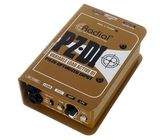This active DI is promoted as specially for orchestral instrument with piezo pick-ups but it is much more useful than that. It has 3 switchable input impedances, the standard 1M ohm like most DI's, 10M for piezos, and 220k to mimic some popular pre-amps. In 1M mode it sounds just like a Radial J48 or other quality active DI's. In 10M mode it is vastly better on piezo pick-ups than a standard active or even Jensen-equipped passive DI as it presents the proper impedance loading to the piezo, giving a fuller freq. response and no longer thin and shrill.
But I find myself using the 220K setting where I would use ordinary DI's all the time, such as for electro-magnetic pickups on bass or microphonic built-in types on acoustic guitar, I love it! This setting makes the PZ-DI a real secret weapon for you. It seems to improve harmonic content, so first impression is of more mids but it is not that simple. I believe this extra mid sound is enhanced harmonics. If it's too middy just adjust EQ or switch to 1M, but I love the enhanced detail in this mode. I find many bass guitars sound better this way; don't let the bass player tell you he needs his amp settings, you can do it yourself and get a much better result if you DI the bass straight off the pickup and use your own EQ. It is a much cleaner and better circuit than almost any bass amp's direct out. Connect both if you like and compare, or find a blend, I'm sure you'll prefer the DI. The phase switch can be useful when you do this, use whichever setting gives the loudest signal when mixing both.
It also has a variable high-pass filter and a fixed low-pass on the input. So between these and 3 input Z settings you have powerful controls over the signal straight from the instrument before ever reaching your console. A wonderful feature is a recessed switch allowing the Link output to be taken after the input buffer section, meaning the instrument amp can also get the benefit of the input Z setting and the HPF and LPF; I've seen it dramatically transform the sound of a guitar amp used with a violin with piezo pick-up, which had been much to thin and shrill before due to non-optimal Z. Noisy pick-ups are made clean by simply using the LPF switch and muddy sound improved by setting the variable HPF. A very powerful box. It is the same basic circuit as the Radial ToneBone pedal but packaged as a DI.
Using 2 of these on some vintage electric pianos and organs can give you a dramatic improvement over other DI's or line inputs to modern consoles with fixed Z. The buffer switch can also improve the sound of the instrument when connected to an amp, that violinist rushed out to buy one straight after the gig where I used this on her amp! Now I want another one so I can have one on magnetic bass pick-ups and another for acoustic or "stomp boxes" with piezos, or to use 2 for stereo outputs.
This has been one of my favourite purchases for live sound recently. Highly recommended. I just wish it had a 2nd Pad setting of ~30dB like some DI's (to connect to a guitar amp's speaker out) and a feature like other Radial DI's to merge the input and link sockets to mono, to make it the most versatile possible DI, but it's fantastic as it is and as a full-time live mixer I don't like to be without it. For this price you won't find much else with so much power to enhance an instrument signal right from the pickup and prepare it perfectly for the console


